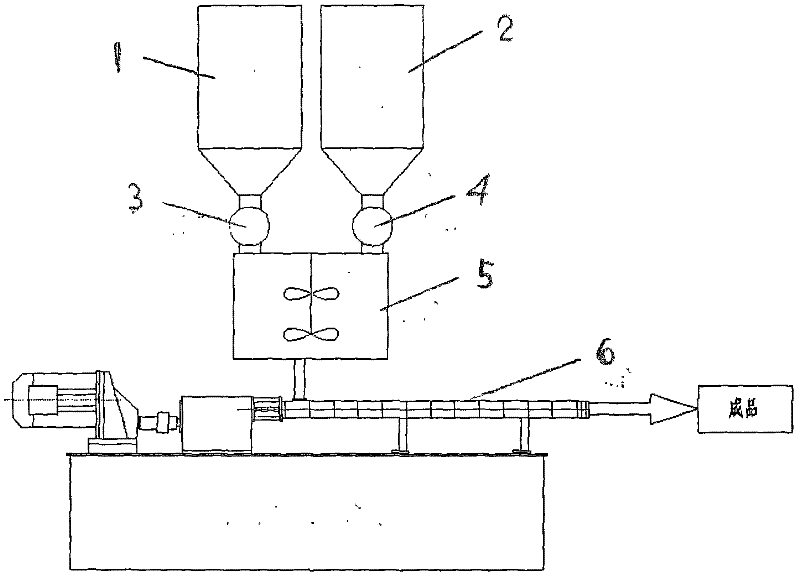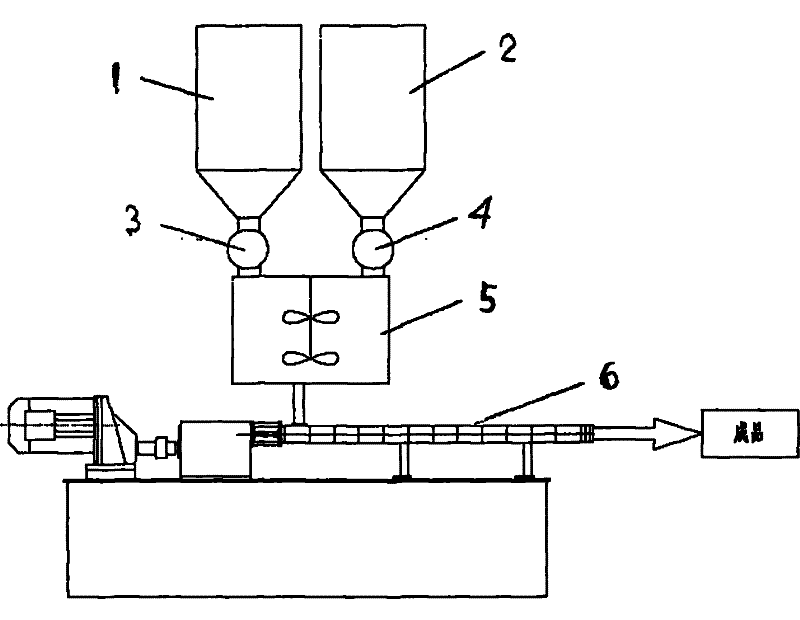Low-alcoholysis-degree polyvinyl acetate (PVA) continuous alcoholysis process
A technology of alcoholysis degree and alcoholysis, which is applied in the direction of chemical recycling, can solve the problems of wide distribution of alcoholysis degree, low production efficiency, high recycling cost, etc., and achieve the effect of reducing recycling cost, reducing neutralization cost and reducing usage
- Summary
- Abstract
- Description
- Claims
- Application Information
AI Technical Summary
Problems solved by technology
Method used
Image
Examples
Embodiment 1
[0024] PVAc methanol solution and NaOH methanol solution are charged into tank 1 and tank 2 respectively, and pass through metering pump 3 and metering pump 4 respectively. Mass concentration is that the PVAc methanol solution of 30% is that the NaOH methanol solution of 0.5% is added in the prereactor 5 with the flow rate of 20kg / h and concentration with 8.4L / h, and the prereactor 5 temperature is 55 ℃, stirs and mixes 0.6 minute, After mixing evenly, add it to the reactive twin-screw extruder 6 for alcoholysis reaction. The temperature of the extruded product at the head of the twin-screw extruder 6 is 70°C, the residence time is 3 minutes, and the extruded product is white granular solid, then quickly put the extruded product into 0.7% acetic acid, stir and wash for 3-5 minutes, separate and dry to obtain PVA particles. The degree of polymerization of polyvinyl alcohol (PVA) is 200-5000. After testing, the degree of alcoholysis of the produced PVA granules is 88%, among wh...
Embodiment 2
[0026] Be that the PVAc methanol solution that mass concentration is 50% with the flow rate of 20kg / h and the NaOH methanol solution that concentration is 1.2% add in the prereactor 5 with the flow rate of 5.4L / h respectively, the prereactor 5 temperature is 55 ℃, stirring Mix for 2.5 minutes, mix evenly and add to reactive twin-screw extruder 6 to carry out alcoholysis reaction. It is a white granular solid, and the extruded product is quickly put into 0.7% acetic acid, stirred and washed for 3-5 minutes, separated and dried to obtain PVA particles. The degree of polymerization of polyvinyl alcohol (PVA) is 200-5000. After testing, the degree of alcoholysis of the produced PVA particles is 86%.
PUM
 Login to View More
Login to View More Abstract
Description
Claims
Application Information
 Login to View More
Login to View More - R&D
- Intellectual Property
- Life Sciences
- Materials
- Tech Scout
- Unparalleled Data Quality
- Higher Quality Content
- 60% Fewer Hallucinations
Browse by: Latest US Patents, China's latest patents, Technical Efficacy Thesaurus, Application Domain, Technology Topic, Popular Technical Reports.
© 2025 PatSnap. All rights reserved.Legal|Privacy policy|Modern Slavery Act Transparency Statement|Sitemap|About US| Contact US: help@patsnap.com


